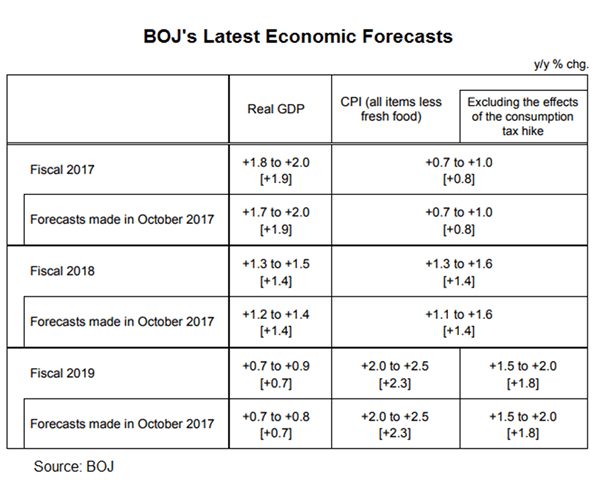BOJ again voted 8-1 to leave the monetary policies unchanged in January. The targets for short- and long-term interest rates stay at -0.1% and around 0%, respectively while the guideline for JGB purchases remains at an annual pace of about 80 trillion yen. As a ritual since he has joined the Board in September 2017, Goushi Kataoka has dissented again. The central bank has turned more upbeat on the inflation outlook although the members left the GDP growth and inflation forecasts unchanged for fiscal years from 2017 to 2019. At this meeting, the members also voted unanimously to extend for one year new the applications for the fund provisioning measure to achieve certain the goals such as stimulating bank lending and supporting economic growth.
The central bank acknowledged that Japanese economy would continue to expand moderately. The members suggested that ‘inflation expectations have moved sideways recently’, compared with previous reference that ‘inflation expectations have remained in a weakening phase’. The members maintained GDP growth estimate at +1.4% for FY 2018 (beginning in March) and +1.8% for the next year. They also kept the forecast that inflation would reach +2% fiscal year ending in March 2020.
Goushi Kataoka dissented again as he warned of ‘risk factors such as the consumption tax hike and a possible economic downturn in the United States’ and reiterated that ‘the possibility of the year-over-year change in the CPI increasing toward 2% going forward is low at this point’. Kataoka added that ‘if there was a delay in the timing of achieving the price stability target due to domestic factors, the Bank should take additional easing measures’.
Japanese yen’s strength against US dollar has accelerated since BOJ reportedly reduce JGB purchases on January 9. We expect Governor Kuroda to encounter at the press conference questions related to the central bank’s commitment in the asset purchase program. Meanwhile, the press conference would also focus on the side effects of the ultra-low interest rate policy as the BOJ is now the only major central banks committing to QE.

